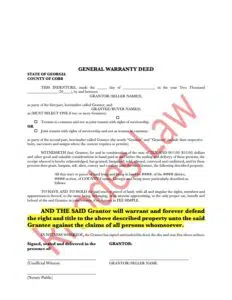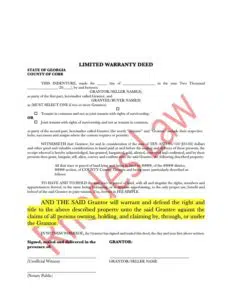General Warranty versus Limited Warranty Deeds
General Warranty versus Limited Warranty: What’s the difference between these two types of deeds?
Both a general warranty deed and limited warranty deed make a specific promise about giving clear title to the property. Both deeds contain a promise that the grantor is conveying clear title to the property. But, the difference between the general warranty and limited warranty is the duration of that promise. For a general overview on deeds, read: The Basics of a Real Estate Deed.
General Warranty Deed
- Makes a promise that the Grantor has good title to a piece of property.
- Promises (warrants) the condition of the title for all time.
Limited Warranty Deed
- Makes a promise that the Grantor has good title to a piece of property.
- LIMITS that promise (warrant) to the period of time to this Grantor’s ownership.
So for example, a title defect arises during a period of time before the Grantor took title. Suppose that it turns out that an old fence actually encroaches on the property from a neighboring property. This would be an example of a title defect. And, now suppose that the new property owner (the grantee) finds out about the encroaching fence when he gets a property survey before trying to build a new pool. Whether the new owner (grantee) can hold the former owner (grantor) responsible for the title defect depends. Did the grantor give the grantee a general warranty deed or a limited warranty deed?
If the Grantor gave a general warranty instead of a limited warranty, the Grantee could potentially hold the Grantor responsible for the title defect. The Grantee could argue that the Grantor should have realized the fence encroached before conveying title.
But, if the Grantor gave only a limited warranty deed, the Grantor would not be responsible for any title defects outside the time period the Grantor owned the property. The Grantor would be able to say that he only guaranteed (warrantied) the title for the period he owned the property. If the fence was existing before the Grantor bought the property, then that may not be his title problem.
The limited warranty deed would prevent the Grantee from being able to hold the Grantor responsible for that title defect that arose before the Grantor originally took the title. It’s a shorter period of time and it’s a better conveyance for a seller than a general warranty deed.
Here are example general warranty and limited warranty deeds with the differing promise language highlighted in yellow:


